Sunday Feb 22, 2026
Sunday Feb 22, 2026
Friday, 26 September 2025 00:06 - - {{hitsCtrl.values.hits}}
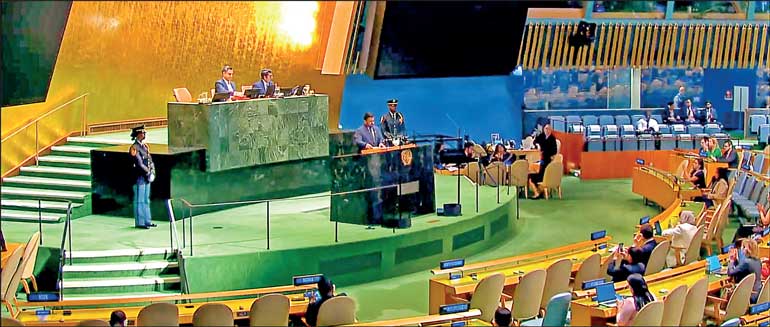
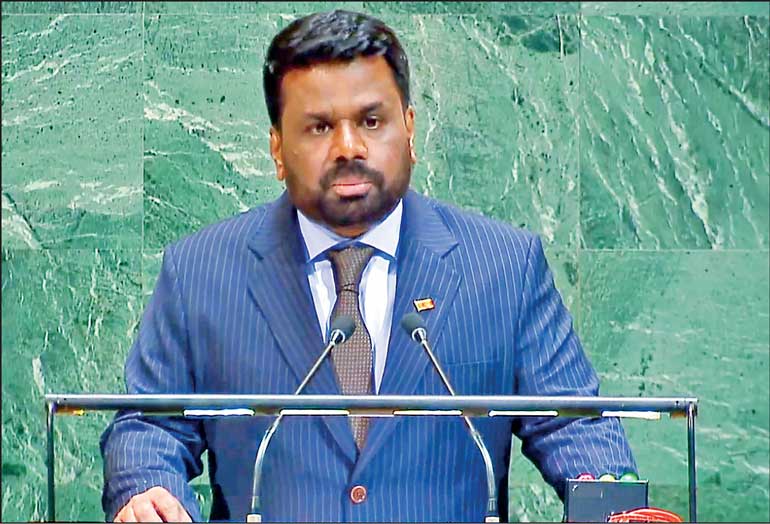
President Anura Kumara Disanayake addresses 80th session of UN General Assembly
President Anura Kumara Disanayake on Wednesday addressed the 80th session of the UN General Assembly in New York which carries the theme: “Better together: 80 years and more for peace, development and human rights”. He focused on the challenges facing both Sri Lanka and the world, urging the international community to confront pressing issues, from poverty and corruption to the devastating effects of war, advocating for a united effort toward peace, human rights, and sustainable development.
Following is the full text of the President’s address:
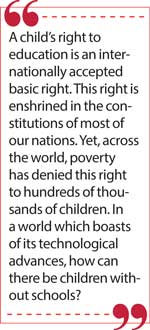 Madam President, Mr General Secretary, honoured invitees, distinguished delegates,
Madam President, Mr General Secretary, honoured invitees, distinguished delegates,
Allow me, Madam Annalena Baerbock, to begin my speech by offering my warmest congratulations to you on being elected President of the 80th session of this unique organisation formed with the noble aim of bringing about a just and lasting peace among and to nations of the world. I would also like to use this opportunity to express my country’s appreciation to His Excellency Philemon Yang for the exceptional leadership he provided during the 79th Session.
We are gathered here today to charter the future path of an organisation which has worked tirelessly for eight decades to bring about a world of peace and democracy. The decisions we make now will impact on people across the world and play a decisive role in the future of this planet, our common home.
Distinguished delegates,
Poverty, a tragedy as old as human civilisation, has accompanied humankind on its journey through time. For centuries, countries across the world have faced this painful and relentless struggle. Poverty, and problems stemming from it, are also casting an oppressive shadow on our future.
Poverty is a terrible enemy with many faces. Even as we gather here, in the countries we represent, including in my own, children are suffering from hunger. Globally, nearly one in eleven people go to bed hungry each night. Across the world, over 700 million people suffer from extreme poverty, trying to eke a living with less than $ 2.15 a day. And one in six children live in extreme poverty globally.
In a world that produces nearly 6 billion tonnes of food every year, one in nine people suffer from hunger or malnutrition. In a world that spends nearly $ 2.4 trillion on military expenditure every year, over 300,000 children under five die from diarrhoeal diseases caused by lack of clean water and sanitation. Half of child deaths globally are linked to hunger.
A child’s right to education is an internationally accepted basic right. This right is enshrined in the constitutions of most of our nations. Yet, across the world, poverty has denied this right to hundreds of thousands of children. In a world which boasts of its technological advances, how can there be children without schools?
Education is the foundation of every great nation. It is the most vital factor deciding the shape of our future. We firmly believe that investment in education is an investment in global progress.
Many developing countries are constrained in their struggle against poverty by indebtedness. In low income countries twice more is spent on net interest rates than on education or health. Our people and our countries are caught in debt traps. The global debt crisis demands an urgent and positive resolution.
The 2030 Agenda for Sustainable Development pledges to leave no one behind and to reach the last first. The Agenda acknowledges the most critical challenge before the world is the challenge to end poverty. I would also like to bring to your notice the decisions taken at the Global Summit for Social Development in Copenhagen in 1995. Unexpected wars and political upheavals and the COVID pandemic obstructed the fulfilment of these hopeful agendas.
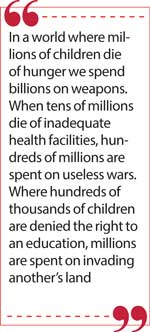 I propose to you that the time has come for us to accept that poverty and inequality are a global catastrophe and act accordingly.
I propose to you that the time has come for us to accept that poverty and inequality are a global catastrophe and act accordingly.
Madam President, esteemed guests,
Drugs and organised crimes linked to drugs constitute the newest problem facing our world. This has been acknowledged in the World Drug Report 2025 published by United Nations Office on Drugs and Crime.
The drug problem has become a complex issue affecting millions of people globally. Drug trafficking mafias are turning entire states into their hunting grounds. They pose a major threat to global health, global democracy, and global politics, and eventually global wellbeing.
We in Sri Lanka are taking urgent and positive steps to face this challenge. I respectfully request all of you join in the effort to activate the global agenda on drugs and crime.
I bring to your notice the need to implement the law strictly against these drug traffickers, prevent drug traffickers from using UN member nations as refuges, and set up rehabilitation centres to help the addicted.
Madam President, honoured guests,
We regard financial corruption as an epidemic bringing destruction and tragedy to broad swathes of society. We believe corruption to be an obstruction to development, a decisive threat to democracy and global wellbeing, and a cause of poverty. Let me remind you the words of President Paul Kagame: “Fighting corruption is dangerous. Not fighting corruption is even more dangerous.”
Spartacus rebelled against slavery in 72BCE. In 1865, President Abraham Lincoln made the historic decision of declaring slavery illegal. In 1910, the Qing Dynasty officially abolished slavery in China. The UN Human Rights Declaration of 1948 was a great step forward to humankind. The great victories of our common human civilisation did not happen in one night. They were all results of limitless commitment and untiring effort.
The struggle against corruption is a difficult one. But we must do it.
“The first step we take might be difficult. But if the courageous step we take is correct, a thousand steps will follow that first step.” I believe this.
Madam President, delegates,
“Be brave. All the rest will follow,” Sri Jawaharlal Nehru said. I represent a small luminous island of nearly 22 million people. Sri Lanka’s population is about 0.28% of global population. It is true that we are small in size and in numbers. Yet we have begun the struggle against corruption for the future generations of our country and the world.
I propose that the struggle against corruption should become an integral part of the culture of all UN member nations.
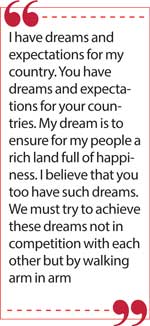 Madam President, esteemed guests,
Madam President, esteemed guests,
I feel confident that all of you will join me in rejecting war. There is no nation in the world that hopes for war. Wherever a war happens, tragedy results. Even now, many lands of the world are experiencing the pain of that tragedy. As a country that lived through a three-decade war, we know well the uselessness of war. No one who sees the pain and the suffering of parents, spouses, and children of the dead at war memorials would want to see a war even in dreams. These painful scenes we have seen with our own eyes.
Even as suffering caused by conflict has reached unprecedented levels, the international community has become reduced to bystanders. Opportunistic power politics has turned lives of children and innocent civilians into a mere football. No one has the right to inflict pain and suffering on another to enhance one’s own power. The duty of a ruler is not to destroy lives but to protect lives.
We are deeply distressed by the ongoing catastrophe in the Gaza Strip. Gaza has been turned into a concentration camp full of pain and suffering, echoing with the cries of children and innocent civilians. The United Nations has accepted that a genocide is being committed in Gaza. The time has come to end the war through an immediate ceasefire, enabling adequate humanitarian aid to reach Gaza and ensuring the release of hostages of all parties. We believe that we must put all pressure to end the horrific killing in Gaza.
We recognise Palestinian people’s inalienable right to their own state. We also believe that legal, defence, and human problems of Israeli and Palestinian people need to be acknowledged. Both sides must get together to implement the UN mandated two states solution, setting up two neighbouring states along 1967 borders. The time has come for the international community to cease being a spectator and move decisively to end the suffering of millions.
Religious extremism and racism have been major causes of wars and conflicts bringing suffering to millions of people. Though slavery has been abolished, the poison of racism lingers in places. Extremist and racist ideas are as deadly as epidemics. We must ask ourselves how these extremist and racist ideas survive, like sparks under the ashes, in a world that has witnessed so many advances on so many fronts. We must be alive to the danger of these sparks being opportunistically turned into infernos threatening the wellbeing of the entire world.
I believe that we must awaken our consciences to oppose racism and religious extremism in protection of human rights and freedoms. We must be brave enough to speak up for peace. We must be afraid to speak up for war. A country’s honour and personality rest in its fight for peace.
 We must move towards the practice of resolving problems not through violence but through humane values of our common civilisation.
We must move towards the practice of resolving problems not through violence but through humane values of our common civilisation.
In a world where millions of children die of hunger we spend billions on weapons. When tens of millions die of inadequate health facilities, hundreds of millions are spent on useless wars. Where hundreds of thousands of children are denied the right to an education, millions are spent on invading another’s land.
If every inch of this world can be turned into peace communities, what a wonderful world that will be! I propose that all of us who are gathered here turn ourselves into peace pilgrims committed to turning our world into a collection of peace communities.
As a country that suffered the horrors of war for decades, where loved ones still weep for their beloved dead, we have a duty to make that heartfelt proposal. We hope our country will not have to experience the horrors of war ever again. We invite the world to witness the miracle of a warless land, a land of peace and beauty. The people of our country opted for a united Sri Lankan nation based on a new political culture. My Government is committed to fulfilling that mandate.
Honoured invitees,
I would like to remind you that at the last election, Sri Lankan people decided in favour of a centuries-old dream. A myriad legislature was born of that decision, reflecting the ethnic and religious diversity of the country, a parliament in which women and other marginalised communities are present in unprecedented numbers including Sri Lanka’s first visually impaired parliamentarian. We are committed to ensure equal rights and opportunities for all our citizens. We have also proved by example that parliamentarians are there to serve the people and not enjoy privileges denied to people.
We believe that the duty of legislators is to develop the country and the people and not themselves.
In the Global Democracy Index 2025, Sri Lanka has moved up 15 places. This is a great victory in a short time. We will strive to move up even more to reach the top tier someday soon.
Madam President, distinguished guests,
Our people have chosen light over darkness. They gave their approval to realise the vision of A Rich Country, A Beautiful Life. To fulfil this historic mandate, we have focused on a non-corrupt administration, poverty eradicating, digitalisation, and a clean country. We also place great emphasis on health and education. We are moving towards these goals step by step.
Madam President, distinguished delegates,
Digital democracy is one of our aims. Ensuring that every person, every land can enjoy the opportunities of the digital age is a global challenge. If we succeed in our task, we will be able to open doors to technology, accelerate development, and strengthen governance. If we fail, technology will turn into one more force worsening inequality, insecurity and injustice.
The digital gap between states that can and cannot wield digital tools is clear. An even greater gap is being created in relation to artificial intelligence. Sri Lanka and many other developing nations are facing challenges in using AI as a development tool due to inadequate infrastructure facilities.
I ask the international community to work together to remove AI technological inequalities. To fund such efforts, we need corporation and united action.
I present to this august assembly a proposal to set up a neutral sovereign “Artificial Intelligence Zone” centred on a green AI data centre, a special economic zone, and a data system facility for partnering countries in Sri Lanka.
Distinguished guests,
During the last several decades, Sri Lanka has demonstrated its commitment to world peace and security through its work on disarmament in global forums. We want to redouble our work with the United Nations and member nations to ensure sustainable peace and collective security through multilateral efforts. We also want to play a greater role in peacekeeping efforts prioritising the protection of vulnerable groups and promoting the fundamental values of the UN Charter.
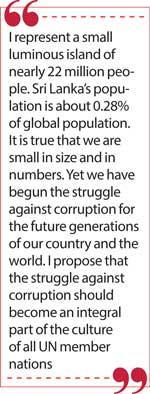 We need a new commitment to peace and justice in this forum and other global forums if we are to move forward in enhancing development and human rights.
We need a new commitment to peace and justice in this forum and other global forums if we are to move forward in enhancing development and human rights.
Madam President, invitees,
We must build a new and a better world, a world which respects the dignity of humankind. You, who are members of this assembly, must be the architects of that better world. As President Harry Truman said, on the occasion of founding the United Nations, “In your hands rests our future”.
We must act not in fear or under compulsion but with hope of a better more secure world. Today we must commit ourselves not to lead the world to another disaster but to make it a better place for the next generation.
I have dreams and expectations for my country. You have dreams and expectations for your countries. My dream is to ensure for my people a rich land full of happiness. I believe that you too have such dreams. We must try to achieve these dreams not in competition with each other but by walking arm in arm.
Peace, dignity, and equality in a healthy planet – that is the UN motto. Let us become the repair-people, the healers of that world.
Thank You.